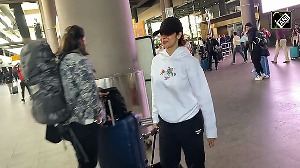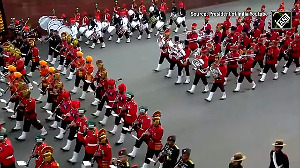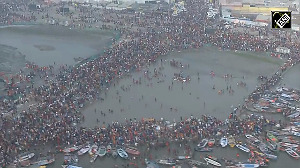As the tsunami toll in India touched 9,000 plus and rising and the biggest relief effort in history gets underway, it seems rather odd that the Indian government has not asked for international assistance.
It is for this reason that the United Nations Disaster Assessment and Coordination teams have reached Thailand, Indonesia, Sri Lanka and Maldives, but none have been despatched to India.
Arjun Katoch, Chief, Field Coordination Support Section and Secretary at the UN Office for Coordination of Humanitarian Affairs, told Senior Features Editor Archana Masih in an e-mailed interview that the UN cannot go to a country without a request from the government.
What places in India are you focussing aid on? How many people have you sent to the Andamans and Tamil Nadu?
No UNDAC team sent to India as the Indian government has not asked for international assistance and the international community including the UN cannot go to a country without a request from the government.
Agencies like yours who are equipped to handle emergencies like these are perhaps tackling such a disaster spanning 10 countries for the first time -- how difficult is it for you? What are the challenges before you in this disaster?
This is the most extensive natural disaster in a generation. We are responding as best as we can and have deployed UN Disaster Assessment and Coordination (UNDAC) teams to assist the governments of Thailand, Indonesia, Sri Lanka and Maldives. The challenges are the sheer scale of the disaster and the extent and diversity of the area covered. Also the number of countries involved.
What are the most important things that your teams fly out with? How many teams have you sent? To which countries? How many people in each time? What nationalities are these aid workers from?
All UNDAC teams are self contained for three weeks. They leave with personal equipment, telecommunications, computers, satellite telephones etc. (They) do not need any assistance at the disaster site. Four UNDAC teams have been sent (to Thailand, Indonesia, Sri Lanka and Maldives).
The teams currently vary from 10 to 4 people in each (country). Sri Lanka has 10 and Maldives has 4 members.
They are emergency managers provided by member states. These teams have people from Australia, China, Denmark, Sweden, Switzerland, Nepal, Singapore, Norway, UK and are led by people from our organisation, the UN Office for Coordination of Humanitarian Affairs (OCHA).
They can be deployed anywhere in the world in 24 hours and that was done this time too. We have carried out 127 UNDAC missions in 73 countries in the last nine years.
'A worse tragedy brewing in Tamil Nadu'
What reports are you getting from your people from the ground? Have you got a scale of what is the most urgent requirement on the ground?
Most essential requirements are clean water, sanitation, tents, medical assistance and food. Reports indicate that in Sri Lanka and Indonesia the situation on the ground is even worse than first reported.In many places communication lines have snapped, roads disappeared, how do your aid workers reach these places?
Whichever way is possible -- walk, jeep, helicopter.
In the tsunami aftermath, water borne diseases are the biggest concern, how can people who have nothing keep themselves safe when perhaps the water all around them is contaminated?
This is a major problem and the priority issue right now. There really is no other way except to make arrangements for clean drinking water to be provided. Normally people in these areas rely on wells. They have to be cleaned and decontaminated before they can be used again.
Call for the biggest relief mobilisation
Rotting bodies in contaminated water provide ideal conditions for diseases such as cholera, typhoid, malaria and diarrhoea -- have you heard of an outbreak anywhere, or at this stage only warnings are being sent to people of a possible outbreak at this stage?
No outbreaks reported yet. There is always a danger. It needs to be watched.
Has your organisation carried such a vast operation before? What would be the cost of such an operation?
No, not on this scale involving so many countries at the same time.
Which countries have offered aid or assistance so far?
Assistance has been offered by the normal donor countries -- the European Union, US, Japan as well as Iran, Qatar, China and India.






 © 2025
© 2025